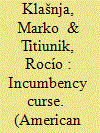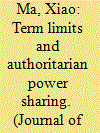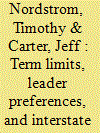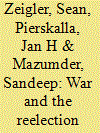|
|
|
Sort Order |
|
|
|
Items / Page
|
|
|
|
|
|
|
| Srl | Item |
| 1 |
ID:
153771


|
|
|
|
|
| Summary/Abstract |
We study how representation works in a context where accountability to voters is restricted because of term limits and accountability to parties is limited because of party weakness. Analyzing all Brazilian mayoral elections between 1996 and 2012 using a regression discontinuity design, we show that becoming the incumbent party results in large subsequent electoral losses. We theorize that the presence of term limits, combined with political parties to which politicians are only weakly attached, affects the incentives and behavior of individual politicians in such a way that their parties’ suffer systematic losses. A descriptive analysis of an original dataset on the career paths of Brazilian mayors suggests that our assumptions are an accurate description of Brazil’s political context, and we find support for three central empirical implications of our theoretical explanation. Moreover, based on an analysis of additional data from Mexico, Peru, Chile, Costa Rica, and Colombia, we show that the negative effects found in Brazil also exist in other democracies.
|
|
|
|
|
|
|
|
|
|
|
|
|
|
|
|
| 2 |
ID:
145828


|
|
|
|
|
| Summary/Abstract |
Term limits that effectively govern leadership transition play an important role in authoritarian power sharing. A fixed term and a pre-appointed successor – two crucial components of term limits – credibly commit the incumbent ruler to share power with other elites, and also allow the elites to monitor and coordinate against the ruler's transgression of the power-sharing agreement. While the successful adoption of term limits often requires an even balance of power among the ruling elites in the first place, once adopted it initiates an evolving bargain over allocation of political power among multiple generations of leaders that further keeps any one faction from dominating the others. I corroborate this argument using a biographical dataset of elite members of the Chinese Communist Party from 1982 to 2012. The findings suggest that the Party's incumbent leaders and their rivals (i.e., predecessor and heir-apparent) shared equal chances in promoting their associates—which proxy their political influence—and this pattern has become more salient since the 16th party congress, when the term limits that currently govern China's leadership transition became fully fledged. This result also sheds light on the role of informal, patronage-based promotion in the institutionalization of authoritarian politics.
|
|
|
|
|
|
|
|
|
|
|
|
|
|
|
|
| 3 |
ID:
157365


|
|
|
|
|
| Summary/Abstract |
Drawing on the idea that electoral accountability is a source for peace, recent scholarship claims that term limits result in democratic leaders who are systematically more likely to initiate conflicts. We consider a broader set of theoretical arguments that allow for the possibility that leaders’ preferences and the strategic environment condition the relationship between term limits and interstate conflict. These arguments suggest multiple hypothetical relationships between term limits and conflict, some of which are conditional on the hawkish or dovish nature of a leader’s preferences. Using a new, leader-year measure of term limits, we find that lame ducks—those incumbents legally prevented from serving as political executives in the following term—are less likely to initiate conflicts, on average, than their electorally accountable counterparts. This result holds among democratic leaders with dovish preferences but not democratic leaders with hawkish preferences, a finding consistent with theories of strategic conflict avoidance.
|
|
|
|
|
|
|
|
|
|
|
|
|
|
|
|
| 4 |
ID:
132323


|
|
|
|
|
| Publication |
2014.
|
| Summary/Abstract |
This article investigates the relationship between term limits and international conflict. Theories of political survival and diversionary war both imply term limits should play a role in international relations, whereas "permanent referendum theory," largely motivated by work in American politics, suggests otherwise. Drawing on these theories, we formulate and test competing hypotheses regarding term limits and international crises. Using dyadic militarized interstate disputes data and information on forty-eight democracies with term limits, we uncover strong evidence to support the claim that leaders reaching final terms in office are more likely to initiate conflict than those still subject to reelection. Moreover, we find that the likelihood of conflict initiation is significantly higher during times of recession, but only in the absence of binding term limits. While binding electoral terms and economic downturns are both independently associated with increased levels of conflict initiation, in concert their conditional effects actually counteract each other.
|
|
|
|
|
|
|
|
|
|
|
|
|
|
|
|
|
|
|
|
|